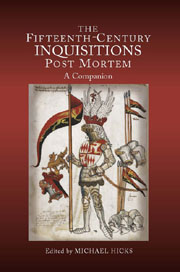Book contents
- Frontmatter
- Contents
- List of Tables and Figures
- List of Contributors
- Preface
- Glossary
- Abbreviations
- 1 Introduction
- 2 Crossing Generations: Dower, Jointure and Courtesy
- 3 The Lesser Landowners and the Inquisitions Post Mortem
- 4 Tales of Idiots, Signifying Something: Evidence of Process in the Inquisitions Post Mortem
- 5 The Value of Fifteenth-Century Inquisitions Post Mortem for Economic and Social History
- 6 ‘Notoriously Unreliable’: The Valuations and Extents
- 7 The Descriptions of Land Found in the Inquisitions Post Mortem and Feet of Fines: A Case Study of Berkshire
- 8 Re-assessing Josiah Russell's Measurements of Late Medieval Mortality using the Inquisitions Post Mortem
- 9 A Great Historical Enterprise: The Public Record Office and the Making of the Calendars of Inquisitions Post Mortem
- 10 Writs and the Inquisitions Post Mortem: How the Crown Managed the System
- 11 ‘Thrifty Men of the Country’? The Jurors and Their Role
- 12 Place-Names and Calendaring Practices
- Index
9 - A Great Historical Enterprise: The Public Record Office and the Making of the Calendars of Inquisitions Post Mortem
Published online by Cambridge University Press: 05 February 2013
- Frontmatter
- Contents
- List of Tables and Figures
- List of Contributors
- Preface
- Glossary
- Abbreviations
- 1 Introduction
- 2 Crossing Generations: Dower, Jointure and Courtesy
- 3 The Lesser Landowners and the Inquisitions Post Mortem
- 4 Tales of Idiots, Signifying Something: Evidence of Process in the Inquisitions Post Mortem
- 5 The Value of Fifteenth-Century Inquisitions Post Mortem for Economic and Social History
- 6 ‘Notoriously Unreliable’: The Valuations and Extents
- 7 The Descriptions of Land Found in the Inquisitions Post Mortem and Feet of Fines: A Case Study of Berkshire
- 8 Re-assessing Josiah Russell's Measurements of Late Medieval Mortality using the Inquisitions Post Mortem
- 9 A Great Historical Enterprise: The Public Record Office and the Making of the Calendars of Inquisitions Post Mortem
- 10 Writs and the Inquisitions Post Mortem: How the Crown Managed the System
- 11 ‘Thrifty Men of the Country’? The Jurors and Their Role
- 12 Place-Names and Calendaring Practices
- Index
Summary
On 27 March 1802 John Caley, secretary to the Record Commission, was compelled, with deep regret, to inform the newly-appointed speaker of the Commons, Charles Abbot, Lord Colchester, that ‘the remuneration ordered to be made to him for his services … is neither adequate to his expectations nor as he conceived to his deserts’. Many project research associates no doubt have shared that sentiment over the years. Yet despite his complaint, Caley went on to perform an important role in the first steps taken to widen access to the public records. Abbot, Caley's mentor, had been a key figure in the establishment of the Record Commission in 1800. Caley's comment that ‘none but Mr Abbot’ could have performed the superintendence of the ‘great business of the National Records’ probably reflected contemporary opinion of Abbot's efforts. Caley complained that he himself was either deficient in the duties assigned, or that they were very light, and therefore begged to be allowed to work on something that was essentially more interesting to him. His connections to Abbot and to Thomas Astle, keeper of records in the Tower, ensured that a specific office of sub-commissioner was created for him at a more than generous annual salary of £500. He thus became responsible for the arranging, binding and repairing of manuscripts within the Tower records repositories.
- Type
- Chapter
- Information
- The Fifteenth-Century Inquisitions 'Post Mortem'A Companion, pp. 169 - 182Publisher: Boydell & BrewerPrint publication year: 2012



